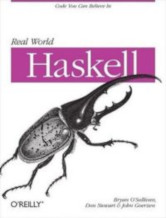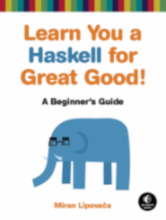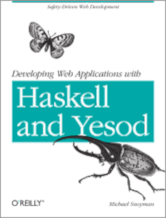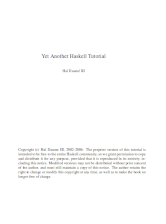Haskell is a standardized, general-purpose, polymorphically statically typed, lazy, purely functional language, very different from many programming languages. It enables developers to produce software that’s clear, concise, and correct.
This is a mature programming language with the first version defined in 1990. It has a strong, static type system based on Hindley–Milner type inference. The main implementation of Haskell is the Glasgow Haskell Compiler (GHC), an open source native code compiler. Recent innovations include static polymorphic typing, higher-order functions, user-definable algebraic data types, a module system, and more. It has built-in concurrency and parallelism, debuggers, profilers, rich libraries and an active community, with thousands of open source libraries and tools.
Haskell offers many advantages to programmers. It helps rapid application development with shorter, clearer code, and higher reliability. It’s suitable for a variety of applications, and often used in academia and industry.
As at June 2019, Haskell ranks 42nd on the TIOBE Programming Community index, an indicator of the popularity of programming languages.
The focus of this article is to select the finest free Haskell books which help programmers master this language, and develop an in-depth understanding of the benefits that this programming language offers. Each book is available to download without payment. Some of the books are available to purchase too.
1. Real World Haskell by Bryan O’Sullivan, Donald Stewart, John Goerzen
 Real World Haskell is our recommended text for anyone wanting to learn functional programming with Haskell.
Real World Haskell is our recommended text for anyone wanting to learn functional programming with Haskell.
You’ll learn how to use Haskell in a variety of practical ways, from short scripts to large and demanding applications. Real World Haskell takes you through the basics of functional programming at a brisk pace, and then helps you increase your understanding of Haskell in real-world issues like I/O, performance, dealing with data, concurrency, and more as you move through each chapter.
This work is licensed under a Creative Commons Attribution-Noncommercial 3.0 License.
The book is also available to purchase in paperback.
2. Learn You a Haskell for Great Good! by Miran Lipovača

Learn You a Haskell for Great Good! is an attractively illustrated guide to this functional language. Packed with the author’s original artwork, pop culture references, and most importantly, useful example code, this book teaches functional fundamentals in a very clear way.
You’ll start with the fundamentals: basic syntax, recursion, types and type classes. Then once you’ve got the basics nailed, the real black belt master-class begins: you’ll learn to use applicative functors, monads, zippers, and all the other mythical Haskell constructs you’ve only read about in storybooks.
There are also paperback, PDF, Mobi and ePub editions available to purchase.
The book is published under a Creative Commons license. The author is a computer science student in Ljubljana, Slovenia.
3. Developing Web Applications with Haskell and Yesod by Michael Snoyman
 Developing Web Applications with Haskell and Yesod teaches you how to create a production-quality web application with Yesod’s ready-to-use scaffolding.
Developing Web Applications with Haskell and Yesod teaches you how to create a production-quality web application with Yesod’s ready-to-use scaffolding.
You’ll also examine several real-world examples, including a blog, a wiki, a JSON web service, and a Sphinx search server.
Advanced sections of the book cover RESTful Content, Yesod’s monads, authentication and authorization, scaffolding and the site template, internalization, and more.
The book is also available to purchase in paperback.
4. Yet Another Haskell Tutorial by Hal Daumé III
 The goal of Yet Another Haskell Tutorial is to provide a complete introduction to the Haskell programming language.
The goal of Yet Another Haskell Tutorial is to provide a complete introduction to the Haskell programming language.
It assumes no knowledge of the Haskell language or familiarity with functional programming in general.
The tutorial aims to be:
- Practical.
- Provide a thorough introduction to the Haskell language.
- Explain the common pitfalls and their solutions.
- Explain how Haskell can be used in the real world.
The book is released under an open source license. It’s an unpublished work, but is definitely worth reading for anyone looking to master Haskell. Hal Daumé III is a professor in Computer Science at the University of Maryland, College Park.
Next page: Page 2 – Happy Learn Haskell Tutorial Volume 1 and more books
Pages in this article:
Page 1 – Real World Haskell and more books
Page 2 – Happy Learn Haskell Tutorial Volume 1 and more books
Page 3 – Parallel and Concurrent Programming in Haskell and more books
All books in this series:
| Free Programming Books | |
|---|---|
| Ada | ALGOL-like programming language, extended from Pascal and other languages |
| Agda | Dependently typed functional language based on intuitionistic Type Theory |
| Arduino | Inexpensive, flexible, open source microcontroller platform |
| Assembly | As close to writing machine code without writing in pure hexadecimal |
| Awk | Versatile language designed for pattern scanning and processing language |
| Bash | Shell and command language; popular both as a shell and a scripting language |
| BASIC | Beginner’s All-purpose Symbolic Instruction Code |
| C | General-purpose, procedural, portable, high-level language |
| C++ | General-purpose, portable, free-form, multi-paradigm language |
| C# | Combines the power and flexibility of C++ with the simplicity of Visual Basic |
| Clojure | Dialect of the Lisp programming language |
| ClojureScript | Compiler for Clojure that targets JavaScript |
| COBOL | Common Business-Oriented Language |
| CoffeeScript | Transcompiles into JavaScript inspired by Ruby, Python and Haskell |
| Coq | Dependently typed language similar to Agda, Idris, F* and others |
| Crystal | General-purpose, concurrent, multi-paradigm, object-oriented language |
| CSS | CSS (Cascading Style Sheets) specifies a web page’s appearance |
| D | General-purpose systems programming language with a C-like syntax |
| Dart | Client-optimized language for fast apps on multiple platforms |
| Dylan | Multi-paradigm language supporting functional and object-oriented coding |
| ECMAScript | Best known as the language embedded in web browsers |
| Eiffel | Object-oriented language designed by Bertrand Meyer |
| Elixir | Relatively new functional language running on the Erlang virtual machine |
| Erlang | General-purpose, concurrent, declarative, functional language |
| F# | Uses functional, imperative, and object-oriented programming methods |
| Factor | Dynamic stack-based programming language |
| Forth | Imperative stack-based programming language |
| Fortran | The first high-level language, using the first compiler |
| Go | Compiled, statically typed programming language |
| Groovy | Powerful, optionally typed and dynamic language |
| Haskell | Standardized, general-purpose, polymorphically, statically typed language |
| HTML | HyperText Markup Language |
| Icon | Wide variety of features for processing and presenting symbolic data |
| J | Array programming language based primarily on APL |
| Java | General-purpose, concurrent, class-based, object-oriented, high-level language |
| JavaScript | Interpreted, prototype-based, scripting language |
| Julia | High-level, high-performance language for technical computing |
| Kotlin | More modern version of Java |
| LabVIEW | Designed to enable domain experts to build power systems quickly |
| LaTeX | Professional document preparation system and document markup language |
| Lisp | Unique features - excellent to study programming constructs |
| Logo | Dialect of Lisp that features interactivity, modularity, extensibility |
| Lua | Designed as an embeddable scripting language |
| Markdown | Plain text formatting syntax designed to be easy-to-read and easy-to-write |
| Objective-C | Object-oriented language that adds Smalltalk-style messaging to C |
| OCaml | The main implementation of the Caml language |
| Pascal | Imperative and procedural language designed in the late 1960s |
| Perl | High-level, general-purpose, interpreted, scripting, dynamic language |
| PHP | PHP has been at the helm of the web for many years |
| PostScript | Interpreted, stack-based and Turing complete language |
| Prolog | A general purpose, declarative, logic programming language |
| PureScript | Small strongly, statically typed language compiling to JavaScript |
| Python | General-purpose, structured, powerful language |
| QML | Hierarchical declarative language for user interface layout - JSON-like syntax |
| R | De facto standard among statisticians and data analysts |
| Racket | General-purpose, object-oriented, multi-paradigm, functional language |
| Raku | Member of the Perl family of programming languages |
| Ruby | General purpose, scripting, structured, flexible, fully object-oriented language |
| Rust | Ideal for systems, embedded, and other performance critical code |
| Scala | Modern, object-functional, multi-paradigm, Java-based language |
| Scheme | A general-purpose, functional language descended from Lisp and Algol |
| Scratch | Visual programming language designed for 8-16 year-old children |
| SQL | Access and manipulate data held in a relational database management system |
| Standard ML | General-purpose functional language characterized as "Lisp with types" |
| Swift | Powerful and intuitive general-purpose programming language |
| Tcl | Dynamic language based on concepts of Lisp, C, and Unix shells |
| TeX | Markup and programming language - create professional quality typeset text |
| TypeScript | Strict syntactical superset of JavaScript adding optional static typing |
| Vala | Object-oriented language, syntactically similar to C# |
| VHDL | Hardware description language used in electronic design automation |
| VimL | Powerful scripting language of the Vim editor |
| XML | Rules for defining semantic tags describing structure ad meaning |
